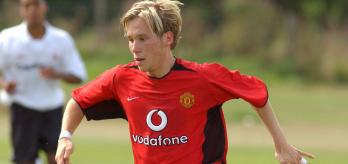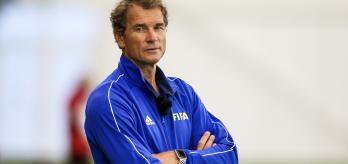Nicknamed “Parede Invisível” (“The Invisible Wall), Silva was born into humble beginnings in Lagoa da Prata, dreaming of becoming a professional. However, unlike many current players who start with clubs at an extremely young age, Silva played football on the streets of Brazil until joining América Mineiro at 17. Three decades later, he speaks to the FIFA Training Centre about his remarkable career, in which he lifted the English Premier League unbeaten with Arsenal FC and the FIFA World Cup 2002™ with Brazil, while also reflecting on the wider pathway to the top for Brazilian players.
Key points
-
Silva explains that hunger, determination and humility gave him to strength to go from working in a factory job at 19 to winning the FIFA World Cup seven years later.
-
He highlights the pressure of playing for Brazil at international level, noting that the 2002 triumph transformed his career and opened the door to European football.
-
Looking back at his journey, Silva emphasises football’s role as an educational platform for young players, while calling for a stronger domestic game in Brazil to retain talent longer.
Watch interview
Read summary
Part 1: A unique journey
Silva had only ever been with an amateur academy, primarily playing street football with his friends and cousins, when he trialled successfully for América Mineiro at 17. However, after just five months, circumstances in his personal life forced him to return home to work in a sweet factory for almost two-and-a-half years. Nevertheless, with his determination to succeed, Silva rejoined América Mineiro at 19, which was the launchpad for his career, eventually earning a spot in Brazil’s squad for the World Cup in 2002. He discusses the pressure of playing for Seleção and that winning the competition had the biggest impact on his career, leading to a move to Arsenal in the same summer. In North London, Silva had to adapt to a new environment, having never played in Europe prior to his transfer, and he talks about how humility and adaptability were the key to having a successful spell with the Gunners.
Part 2: Development pathway in Brazil
Reflecting on the era of Brazilian football that he came through, Silva notes that many players rose from extremely challenging backgrounds. In turn, football offered them hope and an opportunity to support their families financially. However, he views the game as a powerful educational platform that teaches discipline, focus and resilience, even for players who don’t make it in the professional environment. Silva believes that skills learned can be translated to other careers. Furthermore, the former world champion discusses the development of players in his home country, acknowledging that financial pressures often force teams to sell their best talents abroad. He hopes that further investment and international exposure from competitions such as the recent FIFA Club World Cup™ can help Brazilian clubs retain their greatest prospects longer to build a stronger domestic league.















